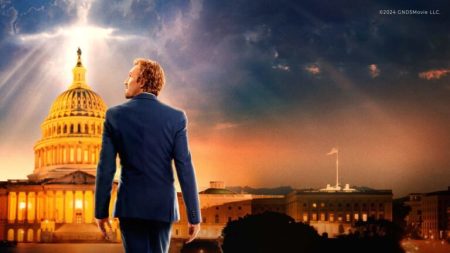New 'God’s Not Dead' film may foster ‘us and them’ mentality in heated election year, expert warns

God is still not dead.
The enduring movie franchise is back this September with its fifth installment in the series, "God's Not Dead: In God We Trust."
The film follows Rev. David Hill's run for U.S. Congress after the sudden passing of an incumbent congressman during "a time of political and spiritual upheaval," according to a synopsis from Fathom Events.
Running against an anti-religion opponent, Hill's congressional bid — like the movie itself — draws attention to "the significance of religious values in shaping policy and governance," per the synopsis.
The movie will be released nationwide on Sept. 12, less than two months before this year's presidential election. National conversations on Christianity's role in government have already reached a fever pitch as mainstream media and progressives continue to sound an alarm about what they refer to as the dangers of "Christian nationalism."
Adam Holz, director of the Christian conservative organization Focus on the Family's Plugged In entertainment review site, said that the intersection of faith and politics is "necessarily a messy one" and hopefully "a catalyst for conversation with people who have potentially different viewpoints than ours."
"My criticism of the franchise as a whole has been that it's just that 'us and them' sort of mentality that I have felt like maybe gets reinforced in some ways that I think it would be healthy for us to talk about rather than embracing. And obviously, it's been a long time since the last one came out."
The film franchise, inspired by the book God's Not Dead: Evidence for God in an Age of Uncertainty by Rice Broocks, has generated some box office success and has been popular with Christian audiences. The series has attracted some well-known actors and actresses.
The first film was released in 2014, followed by "God's Not Dead 2" in 2016. "God's Not Dead: A Light in Darkness" was released in 2018, while "God's Not Dead: We the People" came out in 2021.
The first film, which featured Kevin Sorbo and Dean Cain, generated over $64 billion at the box office, while the second film, which starred actress Melissa Joan Hart, generated over $24 million. The final two films didn't generate anywhere near the box office success that the first two did.
Much like how Christians are depicted in mainstream television and movies, Holz noted how antagonist characters in the "God's Not Dead" franchise are portrayed "very woodenly and very two-dimensionally."
Such depictions do a favor to mainstream entertainment casting Christians in the same ways, Holz said.
Films like "God's Not Dead" can be "rallying cries" and "encouraging," he said, "but I think they're worth a deeper theological look to really think through, 'OK, what does Scripture have to say about our relationship with the world, about people who believe differently than us?'"
"God's Not Dead" will hit theaters a couple of months after the release of "Sound of Hope," the sequel to last summer's box office success "Sound of Freedom" from Angel Studios.
Similar to Angel Studios, brothers and filmmakers Andrew and Jon Erwin have found mainstream appeal with 2023's "Jesus Revolution" and "Unsung Hero" this year, based on the true story of the childhood family struggles of Christian songstress Rebecca St. James and her brothers.
"We're getting more nuanced portrayals both of Christians and non-Christians. And I think that the storytelling across the board is getting better," Holz said.
"I think [Alex, Shannon and Stephen] Kendrick — with each movie they do — they get better at really representing the nuances of faith, as opposed to treating movies as a sermon. And I think that maybe a structural issue with movies like 'God's Not Dead,' is that we're essentially creating a sermon. There's a lot of talking, there's a lot of explication, there's a lot of Scripture reading. … And I think that it's worth asking as storytellers, 'What kind of story most effectively engages people with faith?'"
Even for the Christian viewers who may not take exception to a sermonizing approach, Holz encouraged them to think as deeply, critically and biblically about Christian movies as they do about secular movies.
"Movies are better at asking questions than they are answering them," he said, quoting Christian film producer Ralph Winter.
"And I think that when people say sometimes Christian movies don't work, I wonder if what they're reacting to is there's a sermonizing there that actually doesn't fit a storytelling medium very well because you're hoping somebody has a predetermined response to your story. And that's closer to a sermon than I think what a good movie does."






















